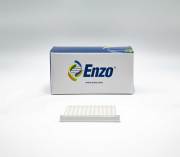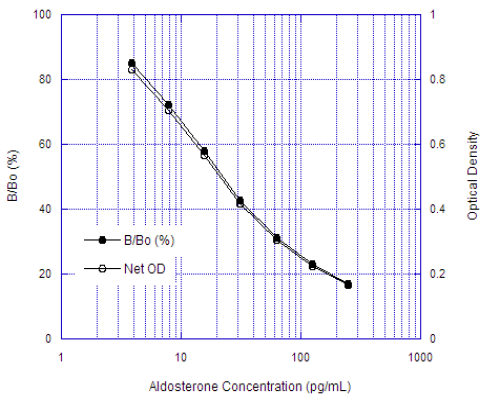Highly specific and sensitive ELISA kit for detection of aldosterone
- Highly sensitive with measurement as little as 4.7 pg/ml of aldosterone
- Negligible reactivity with other steroids
- Validated and tested with human and rodent serum and plasma samples
- Fully quantitative results that surpass semi-quantitative Western blots
The Aldosterone ELISA kit is a colorimetric competitive enzyme immunoassay kit with results overnight + 1 hour.
Aldosterone is a steroid hormone synthesized from cholesterol in the adrenal cortex. Aldosterone is metabolized in the kidney and liver, and functions as the key mineralocorticoid in the control of sodium and potassium balance. Synthesis and release of aldosterone by the adrenal gland is primarily regulated by the renin-angiotensin-aldosterone system (RAAS), the main regulatory system involved in blood pressure regulation, renal hemodynamics, and sodium-volume homeostasis. Measurement of serum aldosterone in conjunction with plasma renin is used clinically to differentiate between primary and secondary aldosteronism. Primary aldosteronism (hyperaldosteronism) is characterized by a very low renin:aldosterone ratio leading to the retention of sodium and increased blood pressure, and is typically the result of renal gland hyperplasia or tumors. In secondary aldosteronism, hyperproduction of aldosterone results from external conditions such as heart failure and renal artery disease that reduce renal blood flow and stimulate the RAAS mechanism. The RAAS directly affects vascular and cardiac remodeling through proliferative and inflammatory signaling, as aldosterone and salt have been shown to increase the expression of intracellular cyclooxygenase-2, osteopontin, and MCP-1 in rats. Aldosterone acts by binding to the mineralocorticoid receptor (MR) triggering the transcription of hormone responsive genes, and clinical studies have shown that patients with congestive heart failure or after myocardial infarction benefited from MR antagonist treatment. As pharmacological modulation of nuclear hormone receptors is a common strategy for the treatment of cardiovascular disease, determining the effect of such treatments on the RAAS is of increasing value in evaluating the safety and efficacy of new targeted therapeutics.
Shipping: Available products typically ship within 24/48h, via priority shipping.
Do you need support? Contact Customer Service or Technical Support.
Online Account
Access or Create Your Account
Product Details
| Application |
Colorimetric detection, ELISA |
|---|---|
| Application Notes |
For the quantitative determination of Aldosterone in plasma, serum, and urine from any species. |
| Assay Time |
Overnight + 1 hour |
| Compatibility |
This product is compatible with the Absorbance 96 Plate Reader. |
| Contents |
DxS IgG Microtiter plate, Conjugate, Antibody, Assay buffer concentrate, Wash buffer concentrate, Standard, pNpp Substrate, Stop solution |
| Crossreactivity |
Aldosterone (100%), 11-Deoxycorticosterone (0.3%), Corticosterone (0.19%), Progesterone (0.20%), and <0.001%: Cortisol, DHT, Estradiol, Testosterone |
| Sensitivity |
4.7 pg/ml (range 3.9 – 250 pg/ml) |
| Species Reactivity |
Species independent |
| Technical Info / Product Notes |
Cited samples: |
| Wavelength |
405 nm |
Handling & Storage
| Use/Stability |
Store all components at -20°C. |
|---|---|
| Shipping |
Blue Ice |
| Regulatory Status |
RUO – Research Use Only |
|---|
- Preoperative activation of the renin-angiotensin system and myocardial injury in noncardiac surgery: exploratory mechanistic analysis of the SPACE randomised controlled trial.: Gutierrez Del Arroyo, A., Abbott, T. E. F., et al.; Br. J. Anaesth. 134, 1300 (2025), Abstract
- Excess dietary sodium restores electrolyte and water homeostasis caused by loss of the endoplasmic reticulum molecular chaperone, GRP170, in the mouse nephron.: Porter, A. W., Vorndran, H. E., et al.; Am. J. Physiol. Renal Physiol. 328, F173 (2025), Abstract
- Chronic ACTH Infusion Alters the Diurnal Rhythm of Sodium Excretion, Inducing Nondipping Blood Pressure and Salt-Sensitivity in Male Mice.: Costello, H. M., Grenier, C., et al.; Hypertension 82, 1754 (2025), Abstract
- β-catenin functions as a molecular adapter for disordered cBAF interactions: Y.S. Chan, et al.; Mol. Cell 15, S1097 (2025), Abstract
- Lack of renal NHE1 exacerbates lithium-induced nephrogenic diabetes insipidus: Blanco, G., Xue, J., et al.; Acta Physiol. (Oxf.) 241, e70029 (2025), Abstract
- Renal arterial dysfunction, impaired pressure natriuresis and salt-sensitivity in a mouse model of Cushing syndrome: Costello, H. M., Grenier, C., et al.; bioRxiv , (2024)
- ATP1A1-linked diseases require a malfunctioning protein product from one allele: K. Spontarelli, et al.; Biochim. Biophys. Acta Mol. Cell Res. 1871, 119572 (2024), Abstract
- Excess dietary sodium partially restores salt and water homeostasis caused by loss of the endoplasmic reticulum molecular chaperone, GRP170, in the mouse nephron: A. Porter, et al.; bioRxiv , (2024), Abstract
- Folic acid antioxidant supplementation to binge drinking adolescent rats improves hydric-saline balance and blood pressure, but fails to increase renal NO availability and glomerular filtration rate: M.D.C. Gallego-López, et al.; FASEB J. 38, e23341 (2024), Abstract
- Influence of the concentration and nature of total dissolved solids in brackish groundwater on water intake, nutrient utilization, energy metabolism, ruminal fermentation, and blood constituents in different breeds of mature goats and sheep: A.K. Patra, et al.; Sci. Total Environ. 907, 167949 (2024), Abstract
- A traditional Korean fermented food, Gochujang exerts anti-hypertensive effects, regardless of its high salt content by regulating renin-angiotensin-aldosterone system in SD rats: Park, J. E., Han, A., et al.; Heliyon 10, e30451 (2024), Sample Type: Rat serum, Abstract
- Integrated renal and sympathetic mechanisms underlying the development of sex- and age-dependent hypertension and the salt sensitivity of blood pressure: Frame, A. A., Nist, K. M., et al.; Geroscience 46, 6435 (2024), Abstract
- Role of paraoxonase 3 in regulating ENaC-mediated Na+ transport in the distal nephron: Mutchler, S., Whelan, S. C. M., et al.; J. Physiol. 602, 737 (2024), Abstract
- Commensal microbiota regulate aldosterone: Moore, B. N., Medcalf, A. D., et al.; Am. J. Physiol. Renal Physiol. 326, F1032 (2024), Abstract
- Loss of the alpha subunit distal furin cleavage site blunts ENaC activation following Na+ restriction.: Nickerson, A., Sheng, S., et al.; J. Physiol. 602, 4309 (2024), Abstract
- Effects of the concentration and nature of total dissolved solids in drinking water on feed intake, nutrient digestion, energy balance, methane emission, ruminal fermentation, and blood constituents in different breeds of young goats and hair sheep: A.K. Patra, et al.; Anim. Nutr. 16, 84 (2023), Abstract
- Renin-angiotensin-aldosterone system function in the pig-to-baboon kidney xenotransplantation model: Hansen-Estruch, C., Bikhet, M. H., et al.; Am. J. Transplant. 23, 353 (2023), Abstract
- High salt intake activates the hypothalamic-pituitary-adrenal axis, amplifies the stress response, and alters tissue glucocorticoid exposure in mice: Costello, H. M., Krilis, G., et al.; Cardiovasc. Res. 119, 1740 (2023), Abstract
- Adrenal-Specific KO of the Circadian Clock Protein BMAL1 Alters Blood Pressure Rhythm and Timing of Eating Behavior: Costello, H. M., Crislip, G. R., et al.; Function (Oxf.) 4, zqad001 (2023), Abstract
- Korean fermented soybean paste (Doenjang) has anti-obesity and anti-hypertensive effects via the renin-angiotensin system (RAS) in high-fat diet-induced obese rats: H. Woo, et al.; PLoS One 18, e0291762 (2023), Sample Type: Rat serum, Abstract
- Social isolation exacerbates diet-induced obesity and peripheral inflammation in young male mice under thermoneutrality: Queen, N. J., Huang, W., et al.; iScience 26, 106259 (2023), Abstract
- Wnt16 Promotes Vascular Smooth Muscle Contractile Phenotype and Function via Taz (Wwtr1) Activation in Male LDLR-/- Mice: Behrmann, A., Zhong, D., et al.; Endocrinology 165, (2023), Abstract
- Perfluorooctane sulfonic acid modulates expression of placental steroidogenesis-associated genes and hormone levels in pregnant rats: S.V. Dangudubiyyam, et al.; Reprod. Toxicol. 118, 108390 (2023), Sample Type: Rat plasma, Abstract
- Implications of atrazine concentrations in drinking water from Ijebu-North, Southwest Nigeria on the hypothalamic-pituitary-adrenal axis: F. Owagboriaye, et al.; Drug Chem. Toxicol. , (2023), Abstract
- Effects of amiloride on acetylcholine-dependent arterial vasodilation evolve over time in mice on a high salt diet: S.M. Mutchler, et al.; Physiol. Rep. 10, e15255 (2022), Abstract
- Knockout of the Circadian Clock Protein PER1 (Period1) Exacerbates Hypertension and Increases Kidney Injury in Dahl Salt-Sensitive Rats: Zietara, A., Spires, D. R., et al.; Hypertension 79, 2519 (2022), Abstract
- Alkali therapy protects renal function, suppresses inflammation, and improves cellular metabolism in kidney disease: Pastor Arroyo, E. M., Yassini, N., et al.; Clin. Sci. (Lond.) 136, 557 (2022), Abstract
- Mineralocorticoid receptor antagonism improves transient receptor potential vanilloid 4-dependent dilation of cerebral parenchymal arterioles and cognition in a genetic model of hypertension: Chambers, L. C., Diaz-Otero, J. M., et al.; J. Hypertens. 40, 1722 (2022), Abstract
- A cardiac-null mutation of Prdm16 causes hypotension in mice with cardiac hypertrophy via increased nitric oxide synthase 1: J.O. Kang, et al.; PLoS One 17, e0267938 (2022), Abstract
- Kidney-specific KO of the circadian clock protein PER1 alters renal Na+ handling, aldosterone levels, and kidney/adrenal gene expression: Douma, L. G., Costello, H. M., et al.; Am. J. Physiol. Renal Physiol. 322, F449 (2022), Abstract
- Guanylyl cyclase-A phosphorylation decreases cardiac hypertrophy and improves systolic function in male, but not female, mice: B.M. Wagner, et al.; FASEB J. 36, e22069 (2022), Sample Type: Mouse plasma, Abstract — Full Text
- The molecular chaperone GRP170 protects against ER stress and acute kidney injury in mice: Porter, A. W., Nguyen, D. N., et al.; JCI Insight 7, (2022), Abstract
- The microbiota-gut-kidney axis mediates host osmoregulation in a small desert mammal: Z. Nouri, et al.; NPJ Biofilms Microbiomes 8, 16 (2022), Abstract
- The prognostic importance of the angiotensin II/angiotensin-(1–7) ratio in patients with SARS-CoV-2 infection: L.M. Amezcua-Guerra, et al.; Ther. Adv. Respir. Dis. 16, 17534666221122500 (2022), Abstract
- Low-salt diet increases mRNA expression of aldosterone-regulated transporters in the intermediate portion of the endolymphatic sac: A. Matsubara, et al.; Pflugers Arch. , (2022), Abstract
- Differential roles of VPS and RAAS in water homeostasis and a risk for kidney dysfunction in rats undergoing rapid fasting/dehydration with regular exercise: K. Hasegawa, et al.; Physiol. Rep. 9, e14670 (2021), Sample Type: Rat plasma, Abstract — Full Text
- Kidney-Specific WNK1 Amplifies NCC Responsiveness to Potassium Imbalance: Boyd-Shiwarski, C. R., Beacham, R. T., et al.; bioRxiv , (2021)
- Deletion of Kir5.1 abolishes the effect of high Na+ intake on Kir4.1 and Na+-Cl- cotransporter: Duan, X. P., Wu, P., et al.; Am. J. Physiol. Renal Physiol. 320, F1045 (2021), Sample Type: Mouse , Abstract
- Salt-Sensitivity of Volume and Blood Pressure in a Mouse with Globally Reduced ENaC γ Subunit Expression: E.C. Ray, et al.; Am. J. Physiol. Renal Physiol. 321, F705 (2021), Abstract
- Developmental Vitamin D Deficiency in Pregnant Rats Does Not Induce Preeclampsia: Ali, A., Alexander, S., et al.; Nutrients 13, (2021), Sample Type: Rat serum and tissue lysate (Placenta), Abstract
- Eplerenone Improves Pulmonary Vascular Remodeling and Hypertension by Inhibition of the Mineralocorticoid Receptor in Endothelial Cells: Kowalski, J., Deng, L., et al.; Hypertension 78, 456 (2021), Abstract
- The Expression of RAAS Key Receptors, Agtr2 and Bdkrb1, Is Downregulated at an Early Stage in a Rat Model of Wolfram Syndrome: M. Punapart, et al.; Genes (Basel) 12, 1717 (2021), Sample Type: Rat serum, Abstract
- Sex-dependent Effects of Nephron Ift88 Disruption on Blood Pressure, Renal Function and Cystogenesis: C. Hu, et al.; J. Am. Soc. Nephrol. 32, 2210 (2021), Abstract
- The Effects of Beverage Intake after Exhaustive Exercise on Organ Damage, Inflammation and Oxidative Stress in Healthy Males: T. Tominaga, et al.; Antioxidants (Basel) 10, 866 (2021), Sample Type: Human plasma, Abstract — Full Text
- Loss of Soluble (Pro)renin Receptor Attenuates Angiotensin-II Induced Hypertension and Renal Injury: N. Ramkumar, et al.; Circ. Res. 129, 50 (2021), Sample Type: Mouse plasma and urine, Abstract
- Metabolic syndrome during gestation and lactation: An important renal problem in dams. selenium renal clearance: F. Nogales, et al.; J. Trace Elem. Med. Biol. 64, 126709 (2021), Sample Type: Rat serum, Abstract
- Factors affecting the urinary aldosterone-to-creatinine ratio in healthy dogs and dogs with naturally occurring myxomatous mitral valve disease: A. Galizzi, et al.; BMC Vet. Res. 17, 15 (2021), Sample Type: Canine (Dog) urine, Abstract — Full Text
- Strain-based and sex-biased differences in adrenal and pancreatic gene expression between KK/HlJ and C57BL/6 J mice: Inglis, A., Ubungen, R., et al.; BMC Genomics 22, 180 (2021), Abstract
- The Herbicide Atrazine Potentiates Angiotensin II-Induced Aldosterone Synthesis and Release From Adrenal Cells: Zimmerman, A. D., Mackay, L., et al.; Front. Endocrinol. (Lausanne) 12, 697505 (2021), Abstract
- Water and Electrolyte Homeostasis in a Mouse Model with Reduced ENaC Gamma Subunit Expression: Ray, E. C., Jordahl, A., et al.; bioRxiv , (2021)
- Renal interstitial fibroblasts coproduce erythropoietin and renin under anaemic conditions: K. Miyauchi, et al.; EBioMedicine 64, 103209 (2021), Sample Type: Rat plasma, Abstract — Full Text
- Intercalated cell BKα subunit is required for flow-induced K+ secretion: Carrisoza-Gaytán, R., Ray, E. C., et al.; JCI Insight 5, (2020), Abstract
- Effects of extreme potassium stress on blood pressure and renal tubular sodium transport: Boyd-Shiwarski, C. R., Weaver, C. J., et al.; Am. J. Physiol. Renal Physiol. 318, F1341 (2020), Abstract
- Differential effects of low-dose sacubitril and/or valsartan on renal disease in salt-sensitive hypertension: Polina, I., Domondon, M., et al.; Am. J. Physiol. Renal Physiol. 319, F63 (2020), Abstract
- Kisspeptin deficiency leads to abnormal adrenal glands and excess steroid hormone secretion: A. Berthon, et al.; Hum. Mol. Genet. 2020, ddaa215 (2020), Sample Type: Mouse serum, Abstract — Full Text
- Differences in Renal BMAL1 Contribution to Na + Homeostasis and Blood Pressure Control in Male and Female Mice: G.R. Crislip, et al.; Am. J. Physiol. Renal Physiol. 318, 1463 (2020), Sample Type: Mouse tissue lysate (Kidney), Abstract — Full Text
- Knockout of the circadian clock protein PER1 results in sex-dependent alterations of ET-1 production in mice in response to a high-salt diet plus mineralocorticoid treatment: Douma, L. G., Crislip, G. R., et al.; Can. J. Physiol. Pharmacol. 98, 579 (2020), Abstract
- Persistent Renin-Angiotensin System Sensitization Months After Body Weight Recovery From Severe Food Restriction in Female Fischer Rats: de Souza, A. M. A., Ji, H., et al.; J. Am. Heart Assoc. 9, e017246 (2020), Abstract
- Lipid metabolic signatures deviate in sepsis survivors compared to non-survivors: W. Khaliq, et al.; Comput. Struct. Biotechnol. J. 18, 3678 (2020), Sample Type: Human and Rat plasma, Abstract — Full Text
- Renomedullary Interstitial Cell Endothelin A Receptors Regulate BP and Renal Function: Hu, C., Lakshmipathi, J., et al.; J. Am. Soc. Nephrol. 31, 1555 (2020), Sample Type: Mouse plasma, Abstract
- Receptor-independent modulation of cAMP-dependent protein kinase and protein phosphatase signaling in cardiac myocytes by oxidizing agents: S. Diering, et al.; J. Biol. Chem. 295, 15342 (2020), Abstract — Full Text
- Myogenic vasoconstriction requires G12/G13 and LARG to maintain local and systemic vascular resistance: Chennupati, R., Wirth, A., et al.; Elife 8, (2019), Abstract
- Increased salt intake does not worsen the progression of renal cystic disease in high water-loaded PCK rats: S. Nagao, et al.; PLoS One 14, e0207461 (2019), Sample Type: Rat serum, Abstract — Full Text
- Salt-deficient diet exacerbates cystogenesis in ARPKD via epithelial sodium channel (ENaC): D.V. Ilatovskaya, et al.; EBioMedicine 40, 663 (2019), Sample Type: Rat urine, Abstract — Full Text
- Chronic water insufficiency induced kidney damage and energy dysregulation despite reduced food intake, which improved gut microbiota in female rats: J.W. Daily, et al.; J. Physiol. Sci. 69, 599 (2019), Sample Type: Rat serum, Abstract
- Effects of Doenjang, a Traditional Korean Soybean Paste, with High-Salt Diet on Blood Pressure in Sprague-Dawley Rats: E.G. Mun, et al.; Nutrients 11, 2745 (2019), Sample Type: Rat serum, Abstract — Full Text
- Alteration in microRNA-25 expression regulate cardiac function via renin secretion: H. Li, et al.; Exp. Cell Res. 395, 119 (2018), Sample Type: Mouse serum, Abstract
- Prorenin independently causes hypertension and renal and cardiac fibrosis in cyp1a1-prorenin transgenic rats: G. Zhou, et al.; Clin. Sci. (Lond.) 132, 1345 (2018), Sample Type: Rat plasma, Abstract — Full Text
- Assessment of the Effect of Gasoline Fume on Stress Hormones, Antioxidant Status and Lipid Peroxidation in Albino Rat: F. Owagboriaye, et al.; J. King Saud Univ. Sci. 30, 393 (2018), Sample Type: Rat serum
- Role of the Renin Angiotensin System in Blood Pressure Allostasis-induced by Severe Food Restriction in Female Fischer rats: A.M.A. de Souza, et al.; Sci. Rep. 8, 10327 (2018), Sample Type: Rat plasma, Abstract — Full Text
- Hydrogen sulfide attenuates renin angiotensin and aldosterone pathological signaling to preserve kidney function and improve exercise tolerance in heart: Z. Li, et al.; JACC Basic Transl. Sci. 3, 796 (2018), Sample Type: Mouse tissue lysate (Kidney), Abstract — Full Text
- Effect of renal denervation on urine angiotensinogen excretion in prenatally programmed rats: A. Mansuri, et al.; Physiol. Rep. 5, e13482 (2017), Sample Type: Rat plasma, Abstract — Full Text
- ALD1613, A Novel Long-Acting Monoclonal Antibody to Control ACTH-Driven Pharmacology: A.L. Feldhaus, et al.; Endocrinology 158, 1 (2017), Sample Type: Monkey plasma, Abstract
- The Relationship Between the Renin-Angiotensin-Aldosterone System and NMDA Receptor-Mediated Signal and the Prevention of Retinal Ganglion Cell Death: M. Kobayashi, et al.; Invest. Ophthalmol. Vis. Sci. 58, 1397 (2017), Sample Type: Rat tissue lysate (Vitreous humor), Abstract — Full Text
- 8-Aminoguanosine Exerts Diuretic, Natriuretic, and Glucosuric Activity via Conversion to 8-Aminoguanine, Yet Has Direct Antikaliuretic Effects: Jackson, E. K., Mi, Z., et al.; J. Pharmacol. Exp. Ther. 363, 358 (2017), Abstract
- Age-dependent effects of Armc5 haploinsufficiency on adrenocortical function: Berthon, A., Faucz, F. R., et al.; Hum. Mol. Genet. 26, 3495 (2017), Abstract
- ENaC activity in the cortical collecting duct of HKα1 H+,K+-ATPase knockout mice is uncoupled from Na+ intake: Mironova, E., Lynch, I. J., et al.; Am. J. Physiol. Renal Physiol. 312, F1073 (2017), Abstract
- Modulation of the sympathetic nervous system by renal denervation prevents reduction of aortic distensibility in atherosclerosis prone ApoE-deficient rats: M. Hohl, et al.; J. Transl. Med. 14, 167 (2016), Sample Type: Rat plasma, Abstract — Full Text
- Prenatal Testosterone Exposure Decreases Aldosterone Production but Maintains Normal Plasma Volume and Increases Blood Pressure in Adult Female Rats: A.S. More, et al.; Biol. Reprod. 95, 42 (2016), Sample Type: Rat plasma, Abstract — Full Text
- Thirst responses following high intensity intermittent exercise when access to ad libitum water intake was permitted, not permitted or delayed: S.A. Mears, et al.; Physiol. Behav. 157, 47 (2016), Sample Type: Human plasma, Abstract
- TRPV4 participates in pressure-induced inhibition of renin secretion by juxtaglomerular cells: Seghers, F., Yerna, X., et al.; J. Physiol. 594, 7327 (2016), Abstract
- Antiaging Gene Klotho Regulates Adrenal CYP11B2 Expression and Aldosterone Synthesis: Zhou, X., Chen, K., et al.; J. Am. Soc. Nephrol. 27, 1765 (2016), Abstract
- Effect of Permissive Dehydration on Induction and Decay of Heat Acclimation, and Temperate Exercise Performance: R.A. Neal, et al.; Front. Physiol. 7, 564 (2016), Abstract — Full Text
- Double NF1 inactivation affects adrenocortical function in NF1Prx1 mice and a human patient: Kobus, K., Hartl, D., et al.; PLoS One 10, e0119030 (2015), Abstract
- Impaired natriuretic response to high-NaCl diet plus aldosterone infusion in mice overexpressing human CD39, an ectonucleotidase (NTPDase1): Zhang, Y., Robson, S. C., et al.; Am. J. Physiol. Renal Physiol. 308, F1398 (2015), Abstract
- Effect of renal sympathetic denervation on the progression of paroxysmal atrial fibrillation in canines with long-term intermittent atrial pacing: X. Wang, et al.; Europace 17, 647 (2015), Sample Type: Canine (Dog) plasma, Abstract
- Vitamin D3 May Ameliorate the Ketoconazole Induced Adrenal Injury: Histological and Immunohistochemical Studies on Albino Rats: M.S. Khalil, et al.; Acta Histochem. Cytochem. 48, 103 (2015), Sample Type: Rat plasma, Abstract — Full Text
- Low TGFβ1 expression prevents and high expression exacerbates diabetic nephropathy in mice: C. K. Hathaway, et al.; PNAS 112, 5815 (2015), Sample Type: Mouse plasma, Abstract — Full Text
- Poor Wheel-Running Exercise Can Decrease Blood Pressure through Hormonal Control and Increase Endurance Exercise Capacity in Middle-Aged Normal Rats: S. Sakata, et al.; Journal of Biosciences and Medicines 3, 10 (2015), Sample Type: Rat serum, Full Text
- Clopidogrel attenuates lithium-induced alterations in renal water and sodium channels/transporters in mice: Y. Zhang, et al.; Purinergic Signal. 11, 507 (2015), Sample Type: Mouse urine, Abstract
- Renal denervation attenuates progression of atherosclerosis in apolipoprotein E-deficient mice independent of blood pressure lowering: Wang, H., Wang, J., et al.; Hypertension 65, 758 (2015), Abstract
- Methylglyoxal, a reactive glucose metabolite, increases renin angiotensin aldosterone and blood pressure in male Sprague-Dawley rats: I. Dhar, et al.; Am. J. Hypertens. 27, 308 (2014), Sample Type: Rat plasma, Abstract
- Effect of buttermilk consumption on blood pressure in moderately hypercholesterolemic men and women: V. Conway, et al.; Nutrition 30, 116 (2014), Sample Type: Human plasma, Abstract
- Myosin phosphatase target subunit 1 (MYPT1) regulates the contraction and relaxation of vascular smooth muscle and maintains blood pressure: Y.N. Qiao, et al.; J. Biol. Chem. 289, 22512 (2014), Sample Type: Mouse plasma, Abstract
- Thyroid hormone is required for hypothalamic neurons regulating cardiovascular functions: J. Mittag, et al.; J. Clin. Invest. 123, 509 (2013), Sample Type: Mouse serum, Abstract — Full Text
- Long-term renal denervation normalizes disrupted blood pressure circadian rhythm and ameliorates cardiovascular injury in a rat model of metabolic syndrome: T. Katayama, et al.; J. Am. Heart Assoc. 2, e000197 (2013), Sample Type: Rat urine, Abstract — Full Text
- Enhanced K(+) secretion in dextran sulfate-induced colitis reflects upregulation of large conductance apical K(+) channels (BK; Kcnma1): Kanthesh, B. M., Sandle, G. I., et al.; Am. J. Physiol. Cell Physiol. 305, C972 (2013), Abstract
- Aldosterone induces active K+ secretion by enhancing mucosal expression of Kcnn4c and Kcnma1 channels in rat distal colon: S.K. Singh, et al.; Am. J. Physiol. Cell Physiol. 302, C1353 (2012), Sample Type: Rat serum, Abstract — Full Text
Related Products

| Alternative Name | MR |
|---|---|
| Application | FUNC, ICC, IHC (PS), WB |
| Host | Mouse |
| Isotype | IgG1 |
| Species Reactivity | Chicken, Human, Rabbit, Rat |
Aldosterone ELISA kit
ADI-901-173
The Aldosterone ELISA kit is a colorimetric competitive enzyme immunoassay kit

| Application | Colorimetric detection, ELISA |
|---|---|
| Assay Time | Overnight + 1 hour |
| Sensitivity | 4.7 pg/ml (range 3.9 – 250 pg/ml) |
| Species Reactivity | Species independent |

| Alternative Name | Angiotensin-converting enzyme 1, CD143 |
|---|---|
| Purity | ≥95% (SDS-PAGE) |
| Source | Produced in NSO cells. |
Last modified: August 21, 2024
Datasheet, Manuals, SDS & CofA
Manuals And Inserts
Certificate of Analysis
Please enter the lot number as featured on the product label
SDS
Enzo Life Science provides GHS Compliant SDS
If your language is not available please fill out the SDS request form
 Lab Essentials
Lab Essentials AMPIVIEW® RNA probes
AMPIVIEW® RNA probes Enabling Your Projects
Enabling Your Projects  GMP Services
GMP Services Bulk Solutions
Bulk Solutions Research Travel Grant
Research Travel Grant Have You Published Using an Enzo Product?
Have You Published Using an Enzo Product?


